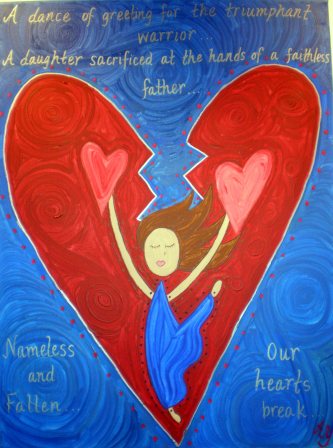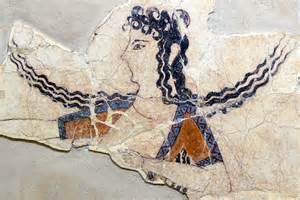Last week I reflected on Angela Yarber’s insightful essay and painting on Jephthah’s daughter. For those who did not read the earlier posts, the story of Jephthah’s daughter is found in the Hebrew Bible. Jephthah’s daughter was sacrificed by her father after he swore in the heat of battle that if his side won, he would sacrifice the first person he would see on returning home. Angela called us to reflect on who Jephthah’s daughter is in our time.
In my earli er midrash on the story, I invoked Daniel Cohen’s powerful retelling of the story of Iphigenia. Cohen concludes that Artemis told Agamemnon that his ships would sail only if he sacrificed his daughter not because she wanted him to do it—but because she hoped this challenge would induce him to realize that the costs of war outweigh any possible gain.
er midrash on the story, I invoked Daniel Cohen’s powerful retelling of the story of Iphigenia. Cohen concludes that Artemis told Agamemnon that his ships would sail only if he sacrificed his daughter not because she wanted him to do it—but because she hoped this challenge would induce him to realize that the costs of war outweigh any possible gain.
I suggested that these words be spoken whenever the story of Jephthah’s daughter is told:
We read this story not to celebrate Jeptheh’s terrible act, but to remind ourselves that every father or mother who goes to war or condones war is signifying his or her willingness to sacrifice not one but many beloved daughters, not one, but many beloved sons.
 As soon as I completed my midrash on the text, I realized that it was incomplete. My midrash glossed over the fact that Jephthah and his counterpart Agamemnon each sacrificed a daughter. When speaking of the story of Jephthah’s daughter as a “text of terror,” feminist commentators generally focus on the fact that in patriarchal societies daughters are considered as less valuable than sons, as property, and as expendable. My midrash had not focused on the gender dynamics of the story.
As soon as I completed my midrash on the text, I realized that it was incomplete. My midrash glossed over the fact that Jephthah and his counterpart Agamemnon each sacrificed a daughter. When speaking of the story of Jephthah’s daughter as a “text of terror,” feminist commentators generally focus on the fact that in patriarchal societies daughters are considered as less valuable than sons, as property, and as expendable. My midrash had not focused on the gender dynamics of the story.
This train of thought brought me back to my series of essays “Patriarchy as a System of Male Dominance Created at the Intersection of the Control of Women, Private Property, and War.” There I presented my theory that patriarchy is an integral system in which the control of women, private property, and war are integrally connected. This suggested another coda or postscript to be spoken whenever the story is read.
We read this story not to condone Jephthah’s terrible act, but to remind ourselves that in patriarchal societies women and girls are considered expendable and are sacrificed every day on the altar of male power as domination.
The story of Jephthah’s daughter provokes us to question the world in which the story of Jephthah’s sacrifice of his daughter can become a sacred text. In matriarchal societies, mothers were honored as the givers of life and no mother’s daughter and no mother’s son would ever have been sacrificed. The values associated with mothers—love, care, generosity—were the highest values. Jephthah would have learned to honor his mother, his sisters, and his nieces. He would have been taught to be gentle, he would not have been told he had to become a hero, and he would never have been conscripted into an army. He would never have sacrificed his daughter on the altar war.
 When we tell the story of Jephthah’s daughter, let us remember that in another time and place Jephthah’s daughter might have danced in honor of the Source of Life, her mothers and uncles might have smiled proudly, and her father might have clapped his hands to urge her on and on in celebration of the joy of life.
When we tell the story of Jephthah’s daughter, let us remember that in another time and place Jephthah’s daughter might have danced in honor of the Source of Life, her mothers and uncles might have smiled proudly, and her father might have clapped his hands to urge her on and on in celebration of the joy of life.
Let us bless the Source of Life.
Carol P. Christ has been busy creating a newly released new website for the Goddess Pilgrimage to Crete which she leads through Ariadne Institute. It is not too early to sign up for the spring or fall pilgrimages for 2014. Carol can be heard on a WATER Teleconference. Carol’s books include She Who Changes and Rebirth of the Goddess and the widely-used anthologies Womanspirit Rising and Weaving the Visions.


Hi Carol, just to add some counterpoint, especially on how differently, as you suggest, a woman author would handle such a scripture story. The only Biblical text which teaches female bonding, the Book of Ruth, and which is thought to have been written by a woman, nevertheless also contains a struggle as regards sacrificing a young maiden, however with a very different outcome. In the story, Naomi, the mother figure, decides to abandon her daughters-in-law after her sons have died, because they are not Israelites but rather Moabites. But Ruth holds on with all her power of love and makes that vow of bonding. It’s important I think to remember Ruth’s pledge, “Wither thou goest, I will go…,” in the context of these other sacrificial stories. In LISTEN TO HER VOICE, Miki Raver concludes: “The Book of Ruth is an exquisite tale about the bond between women. The narrative is unique in Scripture because it centers around a female family struggling for survival in a man’s world. It is a story of women’s culture and women’s values. It is about absolute commitment, embracing connection, and love as a spiritual path.”
LikeLike
I can only picture the mother of Jephthah;s daughter through the eyes of Clytemnestra who in the film Iphegenia that is flashing before my eyes begged her husband not to do it. She like Demeter is a model for the mothers, sisters, and friends we need, in patriarchy to overcome patriarchy.
LikeLike
Thank you, Carol. I like both your responses to the story. I am thinking there could be a litany that combines them.
I thank both you and Angela for bringing Jephthah and her story compassion and illumination.
Also thank you for your response to my post yesterday. I just saw it and left a reply.
LikeLike
These two stories about the the sacrifices of daughters make me think of rape, which is not a sexual act but an act of control. I think they’re the same thing: control over women. Thanks for writing these very thoughtful blogs.
LikeLike
Carol, I am constantly astonished by your beautifully insightful commentaries. Thank you so much. If ever we needed a reminder that a woman’s voice is needed, this is it.
LikeLike
I applaud your revisioning of this story, Carol. It’s a good reminder to all of us that one of the tools of feminism is introducing the women’s point of view (in this case, the matriarchal point of view) as a critique of the waters of patriarchal norms that surround us every day and in which most people swim without even noticing the water around them.
LikeLike
Beautifully said… yes, all this and so much more make me question this world. I love your evocation to remembering what this world once was and can be again.
LikeLike
Thanks to all of you.
LikeLike
Thanks, Carol. A question that came up for me in reading this: daughters are killed, fathers are killed, brothers are killed, but are there any Biblical or mythological stories of the successful sacrifice of a son?
LikeLike
Jesus?
LikeLike
Touche!
LikeLike
So when daughters are sacrificed, they die, and when sons are sacrificed, they don’t die?
LikeLike